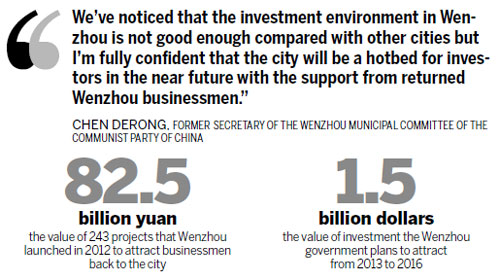Businessmen heading back home to Wenzhou
To attract businessmen back to the city, Wenzhou launched 243 projects in 2012 with a total investment valued at more than 82.5 billion yuan. Wenzhou businessmen away from the city invested over 66.5 billion yuan in 207 of those projects, with overseas merchants contributing over 2.43 billion yuan.
"We've noticed that the investment environment in Wenzhou is not good enough compared with other cities but I'm fully confident that the city will be a hotbed for investors in the near future with the support from returned Wenzhou businessmen," said Chen Derong, former secretary of the Wenzhou municipal committee of the Communist Party of China at the opening ceremony of the third World Wenzhou People Conference in February.
Favorable environment

Chen Derong added that the government will continue to play its role and create favorable business conditions so that businessmen can help stimulate local economic development while reaping the rewards.
Meanwhile, some overseas businessmen decided to come back to open factories and transfer production lines to the city.
Xia Guangyao, the chairman of Wenzhou Jialunte Textile Finery Co Ltd, said he firmly believes that running a business at home is a better way to earn higher profits.
Xia returned to his hometown more than 10 years ago.
"I used to buy scarves from Chinese plants and sell them to European countries when I started my small business in France in 1992 after I noticed that the colorful and cheap accessories were very popular among all the age groups in Europe," said Xia.
Between 1992 and 1996, Xia managed to sell over 20 million scarves and made his first 10 million yuan.
After transforming his business from a scarf firm to a clothes-trading company in 1996, Xia realized that the prices of the products would be more controllable if he could manufacture them.
In 1999, he returned to his hometown and set up his first production base in Wenzhou, employing migrant workers.
"I chose to come back at the peak time of my business in Europe in order to expand my company to a global brand, instead of a small local trader in European countries because it was much cheaper to make and sell products in a chain," said Xia.
Just as Xia expected, having the clothes made in Wenzhou enabled him to obtain an output value of 80 million yuan in 2011, nearly 60 million yuan of which were contributed by export clients. He also registered his brand, the R&G fashion group, in Los Angeles in 2007 to target the US market.
Although his trading business was affected by the global crisis, with a 30 percent drop on the number of overseas orders, he still consistently focused on clothing production and eyed emerging markets such as Brazil, African countries as well as high-end markets in Europe and the US.
"I know I have made the right decision to come back at a good timse and I am quite confident that my made-in-China clothes will be sold in shopping malls all over the world sooner or later," said Xia.
A recent plan to attract investment issued by the city government at the end of 2012 aimed to receive a total amount of $1.5 billion in 2016 with an average annual increase rate of 50 percent.
"I've seen many overseas companies owned by Wenzhou merchants opening their factories and creating brands in Wenzhou in the past decade as they realized that China could be a potential production base for all kinds of products," said Zhou Dewen, chairman of the Wenzhou SME Development Association.
Zhou added that the return of experienced overseas businessmen had brought back innovative concepts and technologies, spurring local companies to restructure and upgrade to achieve higher efficiency and make better products.



















